Share
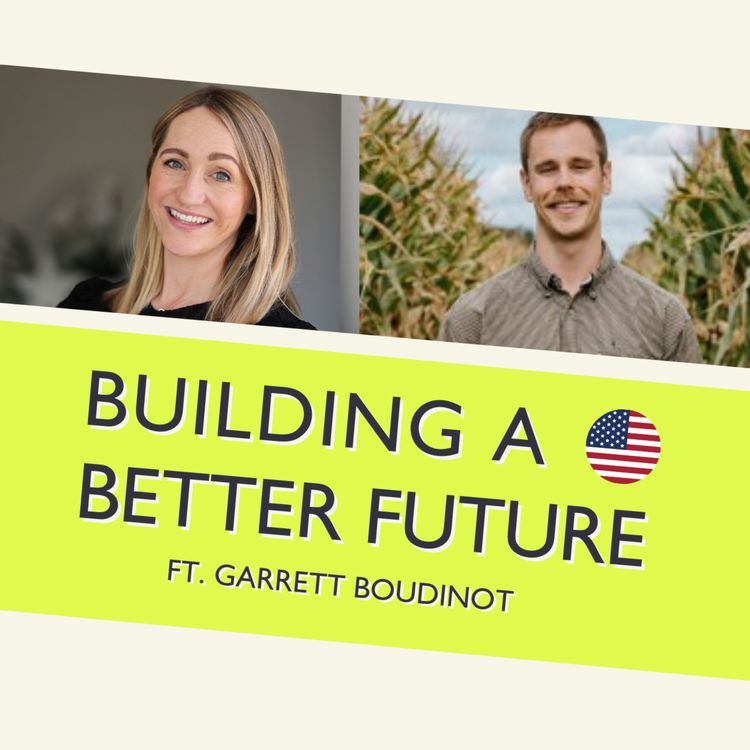
The Climate Pioneers Show
S4: E1. Garrett Boudinot from Vycarb
On our first episode of Building a Better Future:Stories from ClimateTech Founders on the East Coast, I spoke with Garrett Boudinot from Vycarb.
0:15: Introduction
2:00: What is the problem that you’re solving with Vicarb?
4:05: Is there anyone else doing this?
5:22 You’ve got quite a unique gap in this market though right?
6:50: Take me back to the beginning. Where did this passion come from?
09:56: What about the entrepreneurial side? When did you think about moving forward and coming up with a solution to the problem?
13:28: Did Vycarb exist as a business prior to or was it born within Activate?
15:17 How long was the Activate program for?
15:40: How has the last year been? How challenging was it and what were the major roadblocks?
19:50: You’re based out of NewLab in Brooklyn right? Is that linked to Activate?
21:09: Talk to us about your pilots?
24:35: What does the next 12 months have in store for you?
28:10: How have you found the wider market this year?
30:55: How hopeful do you feel for the future of the sector more broadly?
32:50: Is there anything that could help you in some way? What would be your big ask for what could drive you forward this year?
35:08: What community / people-based resource have you found to be the most impactful for your journey so far?
35:38: What media-based resource have you found to be the most impactful for your journey so far?
36:36: Do you have any productivity tips to manage your workload or work-life balance?
37:28: Conclusion
Video versions of these episodes are available here.
More episodes
View all episodes

3. S11: E3. Replacing single use plastic and achieving global scale ft. Linus Larsson Green (PulPac)
41:09||Season 11, Ep. 3Linus Larsson Green is the co-founder and CEO of PulPac, a Swedish deep-tech company pioneering dry moulded fibre, a breakthrough manufacturing technology that turns cellulose pulp into packaging and single-use products that can fully replace plastic.Every year, we produce more than 400 million tons of plastic, with a huge chunk of that used just once but PulPac are tackling that problem head on… PulPac’s unique process uses 90% less water than traditional methods and slashes carbon emissions, while still retaining the ability to mass-product fibre cups, trays and lids at global scale.Over the last 7 years, PulPas has raised major funding, built a network of international licensees and partnered with some of the world’s biggest packaging players. I’m very much looking forward to hearing about this journey in more detail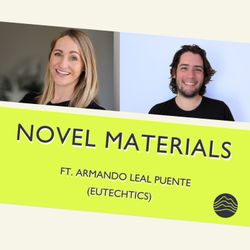
2. S11: E2. Decarbonising the chemical supply chain ft. Armando Leal Puente (Eutechtics)
55:44||Season 11, Ep. 2Today, I’m speaking with Armando Leal Puente, co-founder and managing director of Eutechtics, a deep-tech startup based in Sheffield, that’s taking on one of the biggest challenges in climate and industry - decarbonising the chemical supply chain.Eutechtics has built a platform called EvoCarbon, which turns captured CO₂ into valuable chemical building blocks - things like carboxylic acids that go into everyday products such as cosmetics, food ingredients, pharmaceuticals and even plastics which are currently made using fossil fuels.Armando and his team are reimagining how we make the molecules that power modern life, proving that sustainability and profitability don’t have to be at odds. In just a few years, they’ve secured national innovation funding, won major cleantech awards, and attracted the attention of investors and industry alike.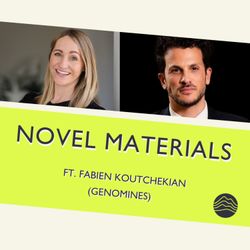
1. S11: E1. Closing a $45m series A ft. Fabien Koutchekian (Genomines)
50:32||Season 11, Ep. 1Fabien Koutchekian is the co-founder and CEO of Genomines, a start-up pioneering the extraction of nickel from the ground. Instead of bulldozers and explosives, Genomines uses genetically enhanced plants, called hyperaccumulators, to pull nickel out of the soil. The result is a process that could deliver battery-grade metal with a fraction of the environmental footprint of traditional mining. With such transformational potential, it’s not a surprise that they successfully closed an incredible $45m Series A raise in September 2025.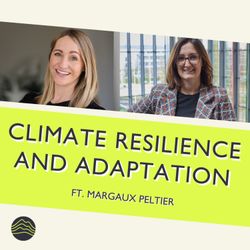
6. S10: E6. Game-changing geothermal power from car parks ft. Margaux Peltier (Enerdrape)
53:04||Season 10, Ep. 6Margaux Peltier is the co-founder and CEO of Enerdrape, a Swiss startup turning underground infrastructure into renewable energy sources. From parking garages to metro tunnels, Enerdrape’s modular geothermal panels harness untapped subterranean heat to provide sustainable heating and cooling for buildings without disruptive drilling or invasive construction.Margaux’s background in HVAC design and engineering was followed by a Masters in Civil Engineering in Lausanne where her thesis formed the basis of Enerdrape’s technology. Since then, she has led Enerdrape through award-winning pilot projects in Switzerland and ambitious expansions into the US, including Chicago’s largest underground parking complex.2:08 - Margaux’s journey from her Master’s thesis to co-founding Enerdrape 3:30 - The scale of the problem Enerdrape is solving 4:45 - How Enerdrape’s geothermal product is unique in not needing invasive drilling and is good for retrofit 6:46 - How are existing spaces being heated and cooled? 8:52 - How did you commercialise the product and what support did you get from your university? 13:13 - Enerdrape’s first commercial project in Lausanne 14:19 - As academic co-founders, how did you handle not having previous sales experience and what advice would you have for others trying to win their first pilots? 17:11 - How has the way you sell your product changed as you’ve learnt more about what your clients are looking for? 22:23 - At what point did you make the decision to go into international markets and how have you found it breaking into the US market? 28:17 - At what point did you need to raise institutional funding outside the university and what was that process like? 30:51 - Lessons from raising a seed round 33:02 - As a young, first-time, female founder, did you feel you faced any challenges or faced any bias during fundraising? 36:19 - How has your team changed and grown since inception? 40:12 - What have been your biggest learnings as you’ve grown the team and as you’ve developed as a manager? 45:40 - What are you excited about for Enerdrape in the next 12-18 months? 47:30 - Margaux’s advice and resources for other founders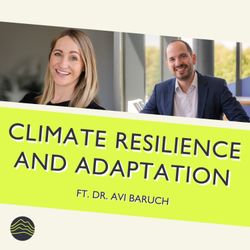
5. S10: E5. Looking beyond the coast to predict flooding ft. Avi Baruch (Previsico)
45:26||Season 10, Ep. 5Dr. Avi Baruch is co-founder and Chief Product Officer of Previsico. Spun out of almost 20 years of groundbreaking research at Loughborough University, the team has developed the Flood Intel Platform - the world’s first real-time, surface-water flood forecasting system. Their mission is to save millions of lives, whilst also helping governments and businesses to save billions on the cost of flooding. Avi and the founding team have taken Previsico from academic research to securing over 200+ customers, operating in multiple geographies, closing over £10 million in funding and scaling the team to over 50 people.2:02 - Intro to Previsico from academic research to spun-out commercial prospect 3:52 - What moment made you realise you had a unique solution to a big problem? 5:12 - What is the scale of the problem around surface flooding? 6:25 - What were some of the benefits of starting out being incubated in an academic environment? 7:53 - What challenges did you face moving from academia into being a first-time founder? 9:58 - How did you find your CEO? 11:45 - How did you commercialise what you’re doing, and what markets did you go after first? 15:33 - When did you know the time was right to branch out into international markets? 17:18 - What frameworks do you have in place to keep you focussed as a company and avoid distractions? 19:27 - What are the main tensions in building a product that is deeply technical but also has to have clear commercial outcomes? 22:00 - How was Previsico initially funded after spinout and how has fundraising progressed? 24:21 - What do you think made you successful in your fundraising? 26:05 - How do you feel the risk resilience market has changed in the seven years since Previsico started? 28:32 - How has the team grown, and what have you done well in that process? 30:34 - What have you learnt along the way about recruiting and retaining a team? 32:05 - At what point did you feel it was the right time to bring in your People and Culture Manager? 33:48 - How has the company culture developed? 36:09 - What practical things do you do with your team to allow for feedback and to help them feel safe enough to question and give feedback? 39:32 - What’s coming up for Previsico over the next year to 18 months? 41:54 - Avi’s advice for other founders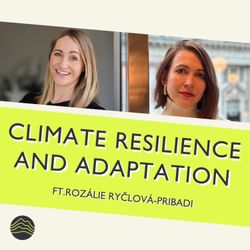
4. S10: E4. Protecting people and assets from natural disasters ft. Rozalie Ryclova-Pribadi (MaxInfo)
43:23||Season 11, Ep. 4Rozalie Ryclova-Pribadi is Chief Strategy Officer and a driving force at MaxInfo. The company uses advanced analytics to help their customers move from reacting to disasters to anticipating them. The Financial Times has said, ‘Extreme weather and climate change caused more financial damage in Europe between 2020 and 2023 than it did in the whole preceding decade', so we’re entering a new era where predicting, anticipating and managing this increasingly common events is more important than ever - and MaxInfo are building the tools to help organisations do exactly that.1:58 - Intro to MaxInfo and the problem they are solving 5:03 - How did the MaxInfo team come up with the initial idea? 7:35 - How much of education gap is there between what you offer and the customers you work with? 10:47 - What markets or customers are you aiming for in the future? 12:59 - The geographical applications and focus for MaxInfo 14:44 - Rozalie’s journey to joining MaxInfo 16:13 - How has Rozalie’s background helped in this role? 18:07 - MaxInfo’s experience with Innovate UK 23:31 - How con companies combine angel investment alongside grant funding? 26:26 - What has it been like going for a VC round recently? What challenges did you face? 29:10 - How have you seen things change since you did VC fundraising in previous roles? 31:34 - How have you built the team at MaxInfo? 34:42 - How did you decide whether to be hybrid or remote? 36:16 - Do you foresee any challenges with building the team in the future in terms of finding deep expertise or being totally invested in your mission? 38:48 - What are key milestones for MaxInfo in the coming months? 40:06 - Rozalie’s advice for other founders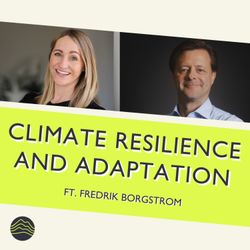
3. S10: E3. Predicting extreme weather to protect lives and businesses ft. Fredrik Borgström (Skyfora)
42:41||Season 10, Ep. 3Fredrik Borgström is the CEO of Skyfora, a Finnish startup reinventing weather intelligence. Skyfora’s technology transforms cell towers into a dense network of atmospheric sensors, generating up to a thousand times more weather data than traditional systems. Combined with advanced AI models and ultra-light radiosondes, this approach promises faster, sharper forecasts for everything from disaster response to renewable energy planning.1:30 - Fredrik’s career to-date.3:45 - How did you come to build Skyfora and what solution are you developing?8:17 - What was your GTM plan for Skyfora?11:40 - How did you decide which customers to go for first?13:49 - Are there certain markets that work better for what you do or any that are more challenging?17:09 - How much opposition or fear are you met with from telecoms providers when trying to get access to their infrastructure?19:56 - What was your funding journey like and what was the appetite like from investors?24:24 - What has your recent fundraise unlocked for you?27:06 - What has gone well or been difficult when building out the team?28:03 - What has enabled you to attract such strong talent?28:39 - How has your role developed from originally being VP of Sale to now being CEO?31:33 - How early in the journey of the company did you build your board of advisors and how did you find them?32:56- What lessons did you learn from previously taking a business through to exit, that you bring with you to Skyfora?35:41 - What is the culture like at Skyfora?37:27 - How do you ensure that team members have the resilience required to work in a startup?39:05 - What are the Skyfora team focusing on for the next couple of years?41:06 - What advice would you give to fellow founders?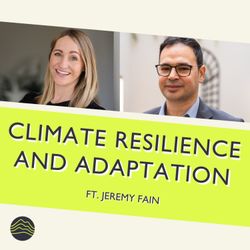
2. S10: E2. Forecasting the future of our most precious resource ft. Jeremy Fain (Blue Water Intelligence)
44:32||Season 10, Ep. 2Jeremy Fain, CEO of Blue Water Intelligence joins me for this episode. After a decade leading SaaS companies, Jeremy shifted his focus to climate and water technology, co-founding BWI to help governments, hydropower operators, insurers and communities forecast and manage water risks in a changing climate.Water is arguably our most critical and increasingly unpredictable resource and BWI is at the forefront of using space and earth data to improve decision-making about floods, droughts and water security. 1:49 - What is BWI doing and why is it so critical?3:05 - How did you come to move into climate resilience?4:41 - How did you find the learning curve personally and how did you bring experts in?6:16 - From a commercial perspective, who are you building this for and who are your key customers?7:55 - How did you manage going to market in both public and private sectors?9:39 - What did you find particularly challenging in the commercial and GTM process?12:17 - How BWI can help hydro-power to be more effective.16:09 - How has BWI been involved in developing hydro-power in Nepal?17:54 - How has your previous experience helped you at BWI?21:25 - When did you decide you needed to make your first hires and how did you go about building out the team?24:52 - When interviewing, how do you establish that people have both a learning curiosity and the hard skills needed to work at BWI?27:32 - What has fundraising been like?36:44 - Why do you think investors should be getting involved with hydrological forecasting?39:06 - What are you excited about in the future of BWI?40:56 - What advice would you offer to fellow founders?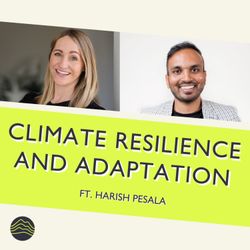
1. S10: E1. Climate resilience is no longer just a 'nice to have' ft. Harish Pesala (SmartResilience)
55:42||Season 10, Ep. 1For the first episode of this series I am joined by Harish Pesala, the co-founder and CEO of SmartResilience, a climate analytics platform helping organisations predict, prepare for, and reduce the impact of extreme weather and other physical risks. Harish launched SmartResilience to close a critical gap between climate science and real-time decision-making. The company has won Innovate UK’s Young Innovators Award, been shortlisted for the edie Awards and National Sustainability Awards, and is already working with major clients from supermarkets to insurers, to make adaptation both practical and actionable.2:52 - What led you to focus on adaptation and why is this critical to the climate crisis?4:51 - How did you work through your career from British Army Reservist to entrepreneur?7:45 - What were the early days like, especially as it was in 2020?10:50 - How did you secure your first clients?12:27 - How did you adapt from having been a technical co-founder to picking up other skills around sales etc.?15:09 - How has user feedback influenced your product as it’s evolved?18:21 - Where are you seeing risk on the corporate agenda now and who within large enterprise businesses is owning it?20:27 - As the world has changed, have you changed how you position SmartResilience?22:28 - How important have industry recognitions and awards been to you?24:12 - How was your fundraising journey?29:57 - How did you go about building your team, initially with angel investor money and then with higher investment later on?32:02 - How do you know whether someone has the grit and resilience they have to work in a startup?33:47 - How has your team grown?36:31 - How did you decide which roles to hire for and when?40:16 - How has your role adapted since the business began?43:05 - Where have you found your mentors and angel investors?44:38 - How do you see the climate resilience and adaption environment evolving in the future?50:29 - What is one key lesson that has been crucial to your success as a founder?